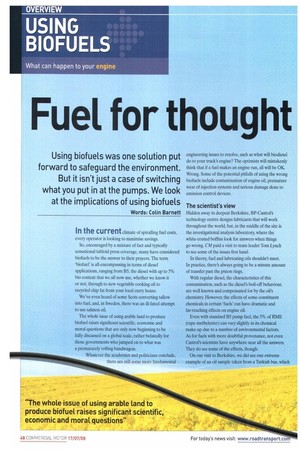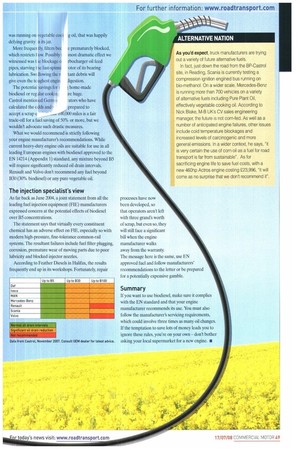Fuel for thought
Page 48

Page 49

If you've noticed an error in this article please click here to report it so we can fix it.
Using biofuels was one solution put forward to safeguard the environment. But it isn't just a case of switching what you put in at the pumps. We look at the implications of using biofuels
Words: Colin Barnett
In the current climate of spiralling fuel costs, every operator is looking to maximise savings.
So, encouraged by a mixture of fact and typically sensational tabloid press coverage, many have considered biofuels to be the answer to their prayers. The term 'biofuel' is all-encompassing in temis of diesel applications, ranging from B5, the diesel with up to 5% bio content that we all now use, whether we know it or not, through to new vegetable cooking oil to recycled chip fat from your local curry house.
We've even heard of some Scots converting tallow into fuel, and. in Sweden, there was an ill-fated attempt to use salmon oil.
The whole issue of using arable land to produce biofuel raises significant scientific, economic and moral questions that are only now beginning to be fully discussed on a global scale, rather belatedly for those governments who jumped on to what was a prematurely rolling bandwagon.
Whatever the academics and politicians conclude, there are still some more fundamental engineering issues to resolve, such as what will biodiesel do to your truck's engine? The optimists will mistakenly think that if a fuel makes an engine run, all will be OK. Wrong. Some of the potential pitfalls of using the wrong biofuels include contamination of engine oil, premature wear of injection systems and serious damage done to emission control devices.
The scientist's view
Hidden away in deepest Berkshire, BP-Castrol's technology centre designs lubricants that will work throughout the world, but, in the middle of the site is the investigational analysis laboratory, where the white-coated boffins look for answers when things go wrong. CM paid a visit to team leader Tom Lynch to see some of the issues first hand.
In theory, fuel and lubricating oils shouldn't meet.
In practice, there's always going to be a minute amount of transfer past the piston rings.
With regular diesel, the characteristics of this contamination, such as the diesel's boil-off behaviour, are well known and compensated for by the oil's chemistry. However, the effects of some constituent chemicals in certain 'fuels' can have dramatic and far-reaching effects on engine oil.
Even with standard B5 pump fuel, the 5% of RME (rape methylester) can vary slightly in its chemical make-up due to a number of environmental factors. As for fuels with more doubtful provenance, not even Castrol's scientists have anywhere near all the answers. They do see some of the effects, though.
On our visit to Berkshire, we did see one extreme example of an oil sample taken from a Turkish bus, which was running on vegetable coot g oil, that was happily defying gravity n its jar.
More frequet tly, filters bee e prematurely blocked, which restricts I ow. Possibly most dramatic effect we witnessed was t ic blockage o rbocharger oil feed pipes, starving I IC fast-spinni -otor of its bearing lubrication. Swl flowing the r tant debris will give even the tc ughest engin ligestion.
The potential savings for I ; home-made biodiesel or reg ilar cookin ire huge.
Castro! mentica ied Germ; .ators who have calculated the ocIds and prepared to accept a scrap e 100,000 miles is a fair trade-off for a fuel saving of 50% or more, but we wouldn't advocate such drastic measures.
What we would recommend is strictly following your engine manufacturer's recommendations. While current heavy-duty engine oils are suitable for use in all leading European engines with biodiesel approved to the EN 14214 (Appendix 1) standard, any mixture beyond B5 will require significantly reduced oil drain intervals. Renault and Volvo don't recommend any fuel beyond B30 (30% biodiesel) or any pure vegetable oil.
The injection specialist's view As far back as June 2004, a joint statement from all the leading fuel injection equipment (FIE) manufacturers expressed concern at the potential effects of biodiesel over B5 concentrations.
The statement says that virtually every constituent chemical has an adverse effect on FIE, especially so with modern high-pressure, fine-tolerance common-rail systems. The resultant failures include fuel filter plugging, corrosion, premature wear of moving parts due to poor lubricity and blocked injector nozzles.
According to Feather Diesels in Halifax, the results frequently end up in its workshops. Fortunately, repair processes have now been developed, so that operators aren't left with three grand's worth of scrap, but even so, they will still face a significant bill when the engine manufacturer walks away from the warranty. The message here is the same, use EN approved fuel and follow manufacturers' recommendations to the letter or be prepared for a potentially expensive gamble.
Summary
If you want to use biodiesel, make sure it complies with the EN standard and that your engine manufacturer recommends its use. You must also follow the manufacturer's servicing requirements, which could involve three times as many oil changes. If the temptation to save lots of money leads you to ignore these rules, you're on your own — don't bother asking your local supermarket for a new engine. •












































































































































































